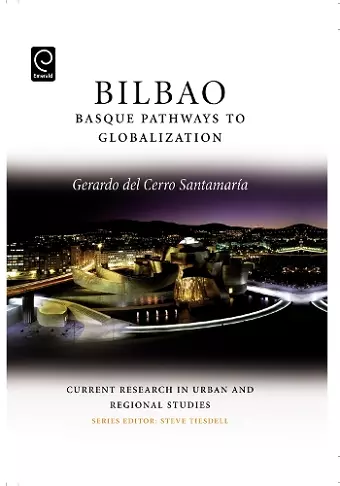Bilbao
Basque Pathways to Globalization
Steven Tiesdell editor Gerardo del Cerro Santamaria editor
Format:Hardback
Publisher:Emerald Publishing Limited
Published:24th Nov '06
Currently unavailable, and unfortunately no date known when it will be back

The gleaming Guggenheim Museum Bilbao has put the Basque capital on the map of world cities and has exacerbated optimism among public officials worldwide about the role of spectacular architecture in urban renewal. This book - a theoretically-informed case study and a major synthesis of Bilbaos developments through the lens of globalization analyzes the Guggenheim project as the latest of Bilbaos globalization efforts, puts the project in the context of Bilbaos decades-long transformation and contends that Bilbaos positive economic performance since 1994 is not fundamentally due to the success of Frank Gehry's building, but rather to a complex array of causal processes that must be understood in the context of Bilbaos connections with the world economy and a changing world-system. The author argues that globalization processes in Bilbao are as old as the city itself and that the role of the State must be taken into account in order to explain the city's changing fortunes throughout the years. Globalization itself ought to be understood as a complex and variable network-like process with multiscalar nodes, an approach which is carefully theorized and empirically developed in this book. This is a volume in the "Current Research in Urban and Regional Studies Series". It takes into consideration Bilbao's social history and the complex relationships between local and global entities (regionalism v. state). It provides a socioeconomic analysis of the "Bilbao Effect".
'Gehry's magnificent museum may have catapulted the Basque city of Bilbao to international consciousness, but it was merely the latest step in this globalizing city's seven-century-long path of reinventing itself to serve the changing needs of an evolving world system. In a remarkable achievement, Del Cerro has written a stunning history of the special semi-independent politics and enviable entrepreneurial talents that enabled the city to adapt from its initial trade, shipping, mining, and manufacturing functions to international banking, services, and culture. This well-documented case study makes a vital contribution to global city studies, now moving at last beyond premature generalizations to variations in contexts and agency.' Janet L. Abu-Lughod, author of Before European Hegemony and New York, Chicago, Los Angeles: America's Global Cities. 'Gerardo del Cerro raises the methodological and analytical bar in studies of globalization through this insightful and finely-crafted historical study of Bilbao. Far from confining his research to the relations between the local and the global, as does most scholarship on cities and globalization these days, del Cerro builds powerful claims around a nuanced analysis of the mediating role that Basque regionalism and the Spanish nation-state play in establishing Bilbao's global trajectories. Just as there is no end of history in this book, the nation-state is anything but gone -- despite the veritable power of the global and despite Basque efforts to use Bilbao as an anchor for a regional imagined community that could effectively compete with the Spanish nation-state. It is precisely the ongoing tension and conflict among these scales of sovereignty that drive Bilbao's flirtation with globalization, both historically and now. This book's appreciation for history and the complexities of scale make it one of the more sophisticated studies of globalization available today.' Diane E. Davis, Massachusetts Institute of Technology 'Since its opening in late 1997, the Guggenheim Bilbao has attracted more than 8 million visitors and generated over 10,000 press articles, mostly from outside Spain. The singular achievement of Gerardo del Cerro's book is to provide a convincing explanation--based on a subtle and detailed historical sociology--of what has come to be known as the 'Bilbao effect'. He provides critical insights on the role of proactive globalizing politicians, bureaucrats and professionals in marketing their city, locating this in its proper historical context, and showing how in this aspect of capitalist globalization as in most others, there are winners and there are losers.'Leslie Sklair, Professor Emeritus of Sociology, London School of Economics and Political Science and author of Globalization: Capitalism and its Alternatives 'Bilbao: Basque Pathways to Globalization gives a clear and comprehensive explanation of the role of cities in a globalized world. Social scientists will welcome the author's novel approach to the mediated and scaled relationships between the local level and global phenomena. For sociologists there is much to learn about globalization and the modern foundations of urban theory. This book is remarkable for the display of criticism that combines historical knowledge and socio-economic analysis to produce a coherent whole, thus opening new venues for social-scientific studies in the future. In developing his innovative approach, the author has built upon some of the best insights that have been proposed during the last years in this rapidly-changing field.' Miguel Beltran, Universidad Autonoma de Madrid 'Gerardo del Cerro's rigorous methodological approach as well as his theoretical framework contribute a vision of Bilbao's evolution which is necessary in order to understand the city's insertion and peculiarities within the process of accelerated globalization we witness today.' Roman Basurto Larranaga, University of the Basque Country, Bilbao
ISBN: 9780080453248
Dimensions: 240mm x 165mm x 23mm
Weight: 535g
242 pages